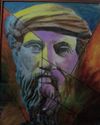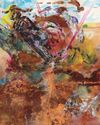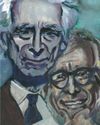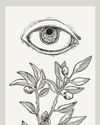
It is likely that most current academic philosophers would agree that there is not remotely a philosopher alive today who matches up to some of the classic philosophers. The last truly great analytic philosopher might have been Wittgenstein; the last great continental philosopher Heidegger. The former died in the 1950s, while the latter passed away in 1976. Probably there are more philosophers working today than ever before, and certainly some of them are very good and interesting, but are any of them great? Will some thinkers working today eventually come to be recognised by future generations as having been great? Nobody seems to have much confidence in this.
Of course, 'greatness' is an unclear term. Yet, it doesn't seem controversial to say that 'greatness' is a laudible attribute of particularly insightful, creative, revolutionary, or impactful philosophy - usually with a breadth that transcends the narrow specialization of modern academic disciplines with their categories and subcategories.
It is not merely a that little philosophy today is done even with the aspiration to be great. There should be an imperative to strive for such greatness, just because this greatness means particularly insightful, creative, revolutionary, or impactful philosophy that is, all the things that are desirable in philosophy. This applies in particular to those fields that influence the wider life of society, such as ethics, and social, economic, or political philosophy. If these fields can potentially contribute to the betterment of the human condition, then those toiling within them are under a moral obligation to strive to produce great work. Yet, while authors such as Marx or Keynes had a powerful impact on society (in many respects due to the intellectual quality of their work), contemporary research in such 'normative' fields has little influence on anybody except other academic philosophers.
Denne historien er fra October/November 2023-utgaven av Philosophy Now.
Start din 7-dagers gratis prøveperiode på Magzter GOLD for å få tilgang til tusenvis av utvalgte premiumhistorier og 9000+ magasiner og aviser.
Allerede abonnent ? Logg på
Denne historien er fra October/November 2023-utgaven av Philosophy Now.
Start din 7-dagers gratis prøveperiode på Magzter GOLD for å få tilgang til tusenvis av utvalgte premiumhistorier og 9000+ magasiner og aviser.
Allerede abonnent? Logg på

FALLING DOWN
Thomas R. Morgan considers how personal identity is maintained, and how it is lost.

Pythagoras (570-495 BCE)
Daniel Toré looks beyond the mathematician to the philosopher.

Wordsworth & Darwin
Christine Avery wonders whether poetry can help us to deal with science.

Plants & Philosophy
Caroline Deforche sees similarities between gardening and philosophising.

Dr.Gindi sculptor, has a philosophical conversation with Richard Baron about sensation, life, infinity and, you guessed it, sculpture.
Dr. Gindi is one of Switzerland's foremost sculptors, whose work has been exhibited in many countries.

Thomas Aquinas on Extraterrestrial Life
Babatunde Onabajo tells us why Aquinas did not believe in aliens.

The Fire This Time
Tim Madigan on Ray Bradbury, Bertrand Russell and Fahrenheit 451.

Trust, Truth & Political Conversations
Adrian Brockless wants a recognition of human value in political debate.

Philosophy & The Crown
Vincent Di Norcia on monarchy and stability.

Technologists & Ethicists
Stephen L. Anderson laments inadequate moral insight among tech leaders.